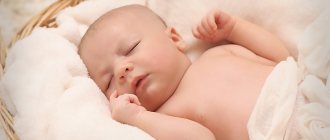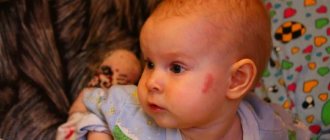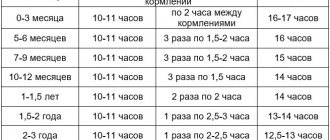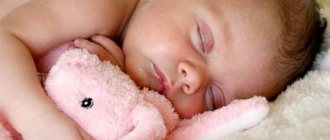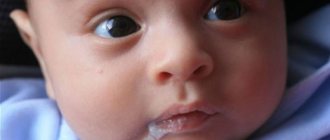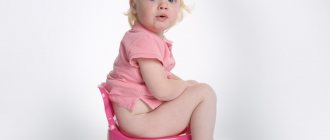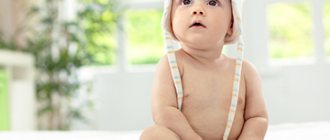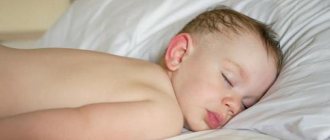Mom shows reverent attention to her baby, who was recently born. And when a baby’s head sweats during feeding, it immediately becomes noticeable and causes a lot of anxiety. But if parents are initially informed about this situation, there will be no worries. Actions will be aimed at identifying the causes and eliminating them.
There are different reasons for sweating of the head in infants, it is important to figure out whether it is worth worrying about
Sweating in infants: features
A child is born fully formed, but some of his systems require time for further development. This also applies to the autonomic nervous system, which controls the process of sweating.
The child sweats during feeding, playing, and sleeping due to imperfect thermoregulation and inadequate functioning of the sweat glands. Interruptions in their work occur frequently.
Only by the age of 5-6 years, maximum 7 years, the sweat glands finally develop, although they begin to actively act already in a 3-4 week old toddler.
It seems strange, but the baby’s head can become covered with droplets of moisture if he is cold. Cold leads to vasoconstriction and sweating. This situation is also created by the temperature difference, to which the baby’s body cannot yet instantly adapt.
When the cause of sweating is rickets
It is much easier to detect this problem compared to other diseases due to the large number of accompanying symptoms. In addition to sweating, the baby exhibits deformation of the skeletal system, a slow growth rate, teething, weak muscle tone, and the back of the head is covered with bald spots. The baby sweats, even when in a completely calm state, and not only the head becomes wet, but also the feet, legs, and palms. The disease is caused by the mother’s unhealthy lifestyle during pregnancy – unbalanced diet, sleep disorders, vitamin deficiency, smoking, and drinking alcohol.
Only with a few similar symptoms can one suspect that a child has rickets. Accurate diagnosis is provided by x-rays and blood tests for calcium, vitamin D, and phosphorus.
Rickets diagnosed in an infant requires immediate treatment. Failure to take timely measures can lead to the development of bone deformities and make the child disabled. Having determined that rickets is the reason why the baby’s head is sweating, the doctor prescribes treatment, where the main role is given to vitamin D. Aquadetrim drops are often used. They dissolve well in water, which is convenient for newborns. An integral part of the therapeutic course is massage and physical therapy. Almost all children in the first year of life are prescribed vitamin D for preventive purposes.
Rickets was considered a common disease several decades ago. Today, children rarely get it. With mother's milk, the baby receives the necessary dose of vitamin D, so during breastfeeding the likelihood of illness is minimal. Modern formulas for newborns also provide the need for all the necessary substances.
Sweat on the baby's head during feeding is not an indicator of rickets. However, this does not mean that nothing can be done.
Physiological reasons: general information
If your baby sweats while breastfeeding, the first thing you need to do is find out what caused it. In many cases, this occurs under the influence of physiological factors, which include:
- Active wakefulness and fatigue. Intense movements of the legs and arms often cause sweating. The same thing can happen with emotional overstimulation as a result of a too busy day. If this is not observed when the baby is calm, the mother’s worries are in vain.
- Milk sucking activity. The process of “obtaining” food for a newborn is quite labor-intensive. Fatigue appears, which promotes sweating. If we talk about artificial feeding, you need to make sure that the flow of milk from the bottle is not difficult. And during breastfeeding, it is important to ensure a comfortable position for the baby.
- Incorrectly chosen clothes. We are talking about synthetics, which should not be on the baby’s body. To ensure that the skin breathes and does not sweat, you need to choose natural fabrics.
- Taking medications. Some medications have a side effect that causes increased sweating. You should always read the instructions.
- Genes. If at least one parent has excessive sweating, the child may inherit this trait.
Excess weight also becomes one of the reasons.
It is important to monitor the diet, especially if the baby is artificial.
There is one more physiological prerequisite that is worth mentioning separately.
In synthetic clothing, the baby’s skin does not breathe and the child sweats
Signs of diseases
It happens that it is still necessary to consult a doctor when the child’s head sweats during feeding or during sleep for no obvious reason. There is a possibility of a serious illness, congenital heart disease, or disruption of the vascular system. Based on some accompanying signs, the doctor can determine the presence of a specific problem. A chest cough, runny nose, high body temperature indicate ARVI, bone deformation is a sign of rickets, and blue lips, skin, and shortness of breath indicate disorders of the cardiovascular system.
Tuberculosis may also be a possible cause of increased sweating.
Tuberculosis may also be a possible cause of increased sweating. The disease is extremely rare in newborns, but nevertheless very dangerous. To be sure, it is better to show the child to a phthisiatrician by doing a Mantoux test. 50% of unvaccinated children are diagnosed with tuberculosis. Typically, dysfunctional families have to deal with this, where mothers suffer from an open form of the disease and infect the fetus during pregnancy.
Another, more common reason that a newborn sweats is lymphatic diathesis - enlargement of the lymph nodes, in which marbling of the epidermis is observed. The disease occurs as a result of fetal hypoxia during childbirth.
Overheating and its consequences
Of course, a newborn needs warmth. But if you overdo it and constantly wrap it up, wearing 2-3 sweaters, overheating and profuse sweating are inevitable.
The baby's body has not yet learned to coordinate temperature and respond quickly in extreme conditions. And if you put on too many clothes or cover him with a warm blanket before feeding, the body will overheat very quickly.
We must not forget that a certain amount of heat also comes from the mother’s hands and body, and in combination with warm clothing or a large amount of it on the baby, a real greenhouse effect is created. Often a consequence of overheating is the appearance of prickly heat on any part of the body, in particular on the head.
The baby may sweat a lot when feeding in an excessively warm room. Therefore, it is very important to establish a comfortable microclimate in the apartment. Air temperature 18-20 °C, maximum – 22 °C. Humidity – 50-70%.
Hyperhidrosis during feeding as a symptom
Provocateurs of sweating are not only harmless reasons associated with caring for a child and his natural physiology. Pediatricians, understanding the problem of why the baby sweats when feeding, discover signs of serious pathologies in the child.
Hyperhidrosis is caused by pathologies of the heart, endocrine glands, infections, and rickets. The disease develops against the background of neurological disorders and vegetative-vascular dystonia.
Infectious diseases
Hyperhidrosis develops with acute respiratory diseases, influenza, pathologies of the respiratory organs and urinary tract. Infections are accompanied by high fever and profuse sweating.
During the period of illness, the baby sweats from the forehead, limbs, torso, and back of the head when feeding and at rest. The development of infection is indicated by symptomatic signs:
- runny nose;
- cough;
- tearing, redness of the eyes;
- fever (fever, chills);
- hot extremities;
- difficulty urinating.
Important! For infections, it is recommended to drink fluids in large quantities. Drinking plenty of fluids increases sweat production and prevents dehydration.
Sweating is caused by drugs prescribed to suppress inflammation and relieve fever. The release of effusion during infection is a positive reaction of the body to irritants. Moisture eliminates the possibility of overheating and helps release “steam.”
Initial stage of rickets
If the back of the baby's head sweats during feeding, rickets may be suspected. The disease is accompanied by characteristic symptoms:
- sleep disturbance;
- irritation;
- bloating;
- fear of piercing sounds;
- urine discharge with a foul, sour odor;
- irritated skin that produces a sour odor;
- skin itching;
- abrasions, bald patches in the occipital region;
- softened cranial bones.
The pediatrician confirms the diagnosis by examining the test results and clinical examination of the child. To prevent and relieve symptoms of rickets, children are given vitamin D.
Neurological features
When a newborn is constantly restless and sweats during feeding, you should visit a pediatric consultation. Hyperhidrosis on the arms, legs, forehead and face occurs due to disorders of the nervous system. Children with psychogenic disorders sleep poorly, get tired and tired quickly, and have difficulty concentrating.
Mild nervous disorders are treated with herbal extracts with a calming effect. For severe pathologies, medications are used.
The child's condition is affected by the emotional atmosphere in the family. The baby does not suffer from hyperhidrosis and nervous diseases in a prosperous environment.
Endocrine disorders
With dysfunction of the endocrine glands, secondary hyperhidrosis occurs and metabolism is disrupted. A child with a disordered metabolism gains excess weight. Physical activity requires considerable effort. As a result, the baby sweats a lot during feeding.
In obese children, sweating decreases after adjusting the diet and reducing body weight. Hyperhidrosis due to hormonal imbalance is eliminated with the help of appropriate medications selected by the doctor.
Cardiovascular disorders
Signs of heart pathologies in infants are difficult to detect. Parents need to closely monitor the child's condition. If the baby sweats while eating, you need to analyze the presence of characteristic symptoms.
For heart and vascular diseases in a baby:
- the head is sweating;
- decreased appetite;
- increased fatigue;
- lethargy occurs;
- the nasolabial triangle turns blue;
- night crying occurs;
- cold sweat is released;
- breathing is rapid;
- shortness of breath appears;
- There is chest pain with pressure or palpation.
Doctors draw up treatment regimens for cardiovascular diseases in children. If parents follow the doctor's recommendations, the child recovers.
Vegetative-vascular dystonia
Dysfunction of nerve fibers and cells reduces the tone of blood vessels. If a child does not receive adequate medical care, the unformed regulatory function develops into severe pathologies.
Attentive parents detect undesirable signs of vegetative-vascular dystonia. In addition to the fact that the baby sweats during feeding, they notice:
- rapid pulse;
- pale skin;
- thermoregulation disorder;
- decreased appetite, weight loss;
- uneven breathing.
Based on the above symptoms, it is difficult to make a reliable diagnosis. Before drawing up a treatment plan, pediatricians diagnose the child’s condition.
Pathological causes: basic information
Does the child sweat when he eats, and is this not related to his physiology? Consultation with a pediatrician is strongly recommended. The whole body can sweat: back, forehead, legs, arms. This process occurs at any time: during sleep, when the child is active or calm. In this case, there is a possibility of the existence of some pathology in the newborn’s body.
What could it be:
- Common cold. With ARVI, the baby not only sweats. Symptoms such as fever, red eyes, cough, stuffy or runny nose, and chills will help you distinguish a cold from more insidious diseases.
- Problems with the nervous system. If the back of the baby's head becomes wet during breastfeeding, you also need to monitor his behavior. If there are disturbances in sleep, attention, fatigue or hyperactivity, there is a possibility of nervous excitability, which leads to excessive sweating.
- Disorders of the heart and vascular system. This pathology can be difficult to determine in children under one year of age. But there are main symptoms, in addition to sweating during feeding: pain in the chest, crying in sleep, pallor, cyanosis of the nasolabial space, poor appetite, difficulty breathing, lethargy.
Sweating is considered normal if the child moves a lot and is very active.
A timely visit to a pediatrician if there are suspicious signs will help identify the pathology and choose the appropriate treatment for the infant. Mom should think about “why the back of my baby’s head gets wet when I feed him.” Early vigilance can reveal serious illnesses.
Development of rickets: how to recognize
There will be no problems in detecting this disease, since it occurs with the presence of other symptoms. Not only does the baby's head become very moisturized, but also the feet and palms. Noticeable bald spots appear on the back of the head.
Characterized by excessive softness of the “fontanelle” and bone deformation. Sweating in an infant in this situation occurs even when he is calm. An immediate visit to the pediatrician is required, especially if the baby turns away from the breast, is capricious, cries, or gets nervous even when the mother is present near him.
To avoid pathology, a woman needs to monitor her health and lifestyle while still pregnant. If the expectant mother does not eat well, does not get enough sleep, prefers a stuffy apartment to fresh air, or suffers from vitamin deficiency, there is a high probability that the newborn will develop rickets.
From alcohol and smoking during pregnancy, the consequences that affect the child are especially deplorable.
Tuberculosis is a dangerous infection
Even a child who is only a few months old can get tuberculosis. The head sweats not only when the toddler suckles, but also under other circumstances. The pathology is dangerous and affects many organs. The lungs suffer.
In half of the cases, tuberculosis affects babies who have not been vaccinated, or if their mothers have an open form of the disease. The child becomes infected while still in the womb or during birth.
A visit to the doctor is mandatory for the following symptoms:
- decreased appetite;
- skin rash;
- discharge from the ears;
- lethargy, drowsiness, irritability;
- bloating;
- enlarged lymph nodes.
Lymphatic diathesis: attention to the child
If more serious symptoms appear, do not delay your visit to the doctor.
Mothers ask themselves, “why, when I feed my baby, does he sweat a lot?” And this is a good question, since such a phenomenon may be a reaction to the development of lymphatic diathesis. The prerequisites for its occurrence are poor functioning of the adrenal glands and malfunctions of the lymphatic system. There are also symptoms:
- muscle tone and body weight decrease;
- on the contrary, weight increases;
- pressure drops;
- there are regular colds;
- skin rashes.
An examination in the clinic will reveal other signs of this disease: an enlarged spleen, a decrease in the level of lymphocytes and glucose in the blood, hypoplasia of the heart.
Solution
If a mother notices that her baby is sweating while breastfeeding, it would be a good idea to contact a pediatrician. The doctor will conduct a thorough examination, rule out possible diseases and suggest why this is happening.
To avoid increased secretion during feeding, the following steps should be taken:
- Do not overly wrap your baby;
- Ventilate the baby's room, especially before bedtime and feeding;
- The optimal room temperature should be 18-22 degrees, and air humidity about 70%;
- Dress the baby only in clothes made from natural fabrics;
- When feeding by hand, choose clothes made from natural materials;
- If the room is warm enough, you should not wear warm socks or a cap;
- You can take your child for a walk every day, before bed.
If your child’s head sweats during feeding, you do not need to select medications for him on your own. First you need to understand the reasons for this phenomenon. It should be noted that the diagnosis is never made based on one symptom. If only the head sweats and only during feeding, most often there is no cause for concern. If a newborn’s hands and feet sweat, not only during feeding, but also during sleep, then this is a reason to consult a doctor.
